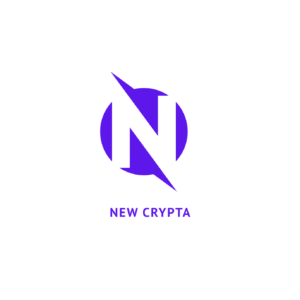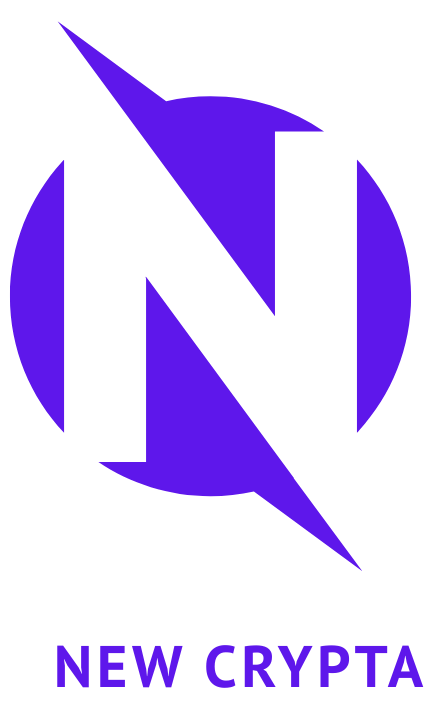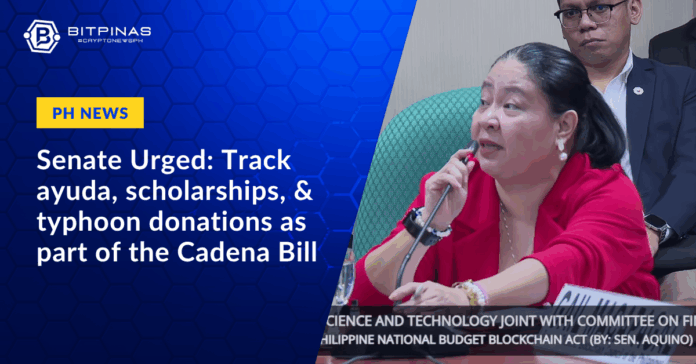Disclaimer: This article is for informational purposes only and does not constitute financial advice. BitPinas has no commercial relationship with any mentioned entity unless otherwise stated.
📬 Get the biggest crypto stories in the Philippines and Southeast Asia every week — subscribe to the BitPinas Newsletter.
During the second public hearing for Senate Bill No. 1330, or the proposed Cadena Bill, stakeholders urged lawmakers to include aid or “ayuda,” scholarships, and disaster-related donations in the scope of blockchain-based transparency measures.
Transparency Concern Raised

Gail Cruz-Macapagal, who represented the Blockchain Council of the Philippines during the hearing and is also country director of DynaQuest, raised concerns about the lack of visibility in how donations during calamities are managed.
In a statement to BitPinas, Cruz-Macapagal said her remarks were prompted by recurring issues in disaster relief operations where donations were reportedly distributed for photo opportunities and later withdrawn or redirected.
“My concern during the hearing was focused specifically on the monitoring and accountability of international aid and relief goods entering the Philippines during a disaster.
While the generosity of foreign donors is essential, the sheer volume and complexity of cross-border logistics create significant vulnerability.
The observed issue is not just about local diversions, but a breakdown in the custody chain of imported aid. This can involve items being initially documented for customs purposes, only to be withdrawn or significantly rerouted after initial press events, with no enforceable record connecting the imported manifest to the final beneficiary.”
Gail Cruz-Macapagal, Country Director, DynaQuest
Cruz-Macapagal identified key weaknesses in the current system for tracking foreign aid, including:
- Donations often lose their digital trace after clearing customs and being handed to local partners, relying on fragmented paper records.
- Agencies, LGUs, and international relief groups also use separate reporting systems, preventing real-time reconciliation of pledged versus delivered aid.
- Documentation of specialized items such as medicines or equipment is inconsistent, making audits difficult and delaying verification of where critical goods are used.

Sen. Bam Aquino, who presided over the session and authored the bill, agreed that donations are not currently covered under existing expenditure logs but assured that such provisions could be included in the bill’s next draft. Moreover, the Department of Budget and Management (DBM) confirmed that while some donation records exist, they only cover certain types of aid and not all contributions.
“Well, considering that we have a reference to source and we’re talking about expenditure, that’s also a source, ‘di ba? So, we also have references to PPPs (Public-Private Partnerships) and the foreign projects, maybe we can include donations.”
Sen. Paolo Benigno Aquino, Senator
“Photo Op” Politics in Disaster Aid

In a Facebook post responding to Cruz-Macapagal’s statement, Rod Albores, co-founder of Reverion Technologies and RER DAO, echoed her concern, saying donations often end up as mere “photo ops” in some areas, with ordinary Filipinos left only in the background.
In a response to BitPinas, Albores recounted that during past calamities in the Visayas, his own relatives and friends lost their homes yet received little help until politicians and their staff coordinated coverage.
“In those first few days, what they needed was immediate relief… food, shelter, clean water. I spoke with those who were directly affected. They shared messages filled with exhaustion, fear and frustration… They told me that relief goods only seemed to arrive when a camera crew did. Trucks and vans rolled into their community only after a politician’s staff confirmed media presence.”
Rod Albores, co-founder, Reverion Technologies and RER DAO
He added that some families received aid only if they were recognized as supporters of certain politicians, while others, equally affected and in need, were told to wait or return the next day, by which time the cameras, and the assistance, were already gone.
Blockchain Tracking for Donations
In a response to BitPinas, Cruz-Macapagal said blockchain could provide a transparent and tamper-proof ledger for all donation-related transactions, ensuring that every transfer, from donor to beneficiary, is timestamped and verifiable.
“This builds both trust and accountability, not only for the public but also for donors and implementing agencies. Blockchain technology is the ideal solution to address these gaps because it fundamentally provides a single source of truth that is both immutable and decentralized.”
Gail Cruz-Macapagal, Country Director, DynaQuest
Each donation, she explained, can be assigned a unique digital ID for immutable tracking, creating an unbroken and auditable chain of custody. Through smart contracts, funds or goods would only be released once delivery or recipient verification is confirmed, minimizing misuse or diversion.
She noted that such a system would serve as a single, decentralized source of truth, allowing both the public and donors to monitor in real time where aid goes and confirm that it reaches its intended beneficiaries.
In addition, Albores also said blockchain technology could bring public accountability by enabling transparent and verifiable tracking of donations and relief goods.
“Blockchain bring about something simple but powerful public accountability. As an enthusiast and developer in the blockchain space, donations can be tracked and fundings can be visible. Relief goods can be logged and verified. It removes the politicians who turns tragedy into photo opportunity.”
Rod Albores, co-founder, Reverion Technologies and RER DAO
Each delivery, he explained, could be recorded on an immutable ledger using hash codes and consensus mechanisms, ensuring every transaction, from donor to recipient, is traceable. He also proposed integrating AI-based verification tools to confirm that aid reaches the right individuals.
What can the Government do
According to Cruz-Macapagal, government agencies should take the lead in integrating blockchain technology into disaster response and relief management to ensure transparency and accountability.
She noted that agencies such as the DSWD, DILG, and Bureau of Customs could use a shared digital ledger to harmonize data, minimize fraud, and set a model for tech-driven governance.
“Government agencies must play a pivotal role, not necessarily in running the blockchain itself, but in providing the necessary regulatory framework and standardization.”
Gail Cruz-Macapagal, Country Director, DynaQuest
This includes mandating interoperability among agencies and accredited partners, establishing uniform data standards for recipient verification, and piloting blockchain programs with private providers to guide future legislation such as Senate Bill 1330.
Cruz-Macapagal said the adoption of such systems would mark a crucial step toward solving long-standing problems in aid distribution, restoring public trust, and ensuring that every donation truly reaches those in need.
Moreover, beyond technology, Albores urged lawmakers to craft policies that ban politicians from turning relief operations into publicity events.
“We need transparency, dignity, and honesty in relief efforts. Blockchain is not the whole solution, there must be a law that prohibits politicians from turning tragedy into marketing opportunities. When help is given, it should not be someone’s public optics. We can build systems where relief is real, immediate, and fair, and where hope arrives long before the cameras do.”
Rod Albores, co-founder, Reverion Technologies and RER DAO
Cadena Bill
Senate Bill No. 1330, formerly called the “Blockchain the Budget Bill,” has been rebranded as the CADENA Act, short for Citizens’ Access & Disclosure of Expenditures for National Accountability.
The measure aims to make every peso of the national budget trackable through a transparent digital system. It is set for sponsorship in the Senate on November 12, with Phase 1 rollout targeted for 2026.
- The CADENA platform will be an open-source digital ledger integrating with existing systems like PhilGEPS and the e-Gov app, with data officially owned by the Filipino people and the DICT acting as custodian.
- A new National Budget and Transparency Accountability Council (NBTAC), co-chaired by the DICT and DBM, with representatives from civil society, academia, and media, will oversee its implementation.
The recent Senate hearing, jointly held by the Committees on Science and Technology and Finance, resolved the key “tech-neutral vs. blockchain-specific” debate. The bill will stay technology-neutral for flexibility, but blockchain remains the preferred standard.
- DICT Undersecretary David Almirol clarified that the specific technology will be defined later in the Implementing Rules and Regulations (IRR).
If enacted, Phase 1 will mandate the immediate online disclosure of all government procurement and spending documents within nine months of approval, establishing the foundation for a long-term, blockchain-ready transparency framework.
For a detailed overview of the bill, its main proponents, and the highlights from the first hearing, check out our full background report here.
This article is published on BitPinas: Senate Urged: Track Ayuda, Scholarships, and Typhoon Donations as part of the Cadena Bill
What else is happening in Crypto Philippines and beyond?




